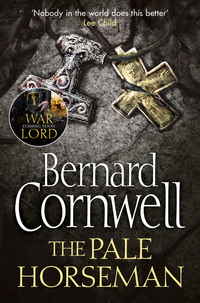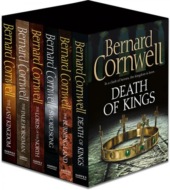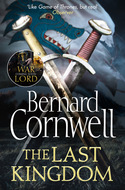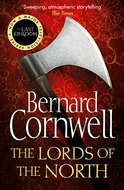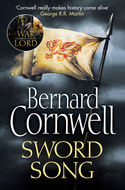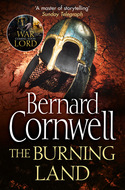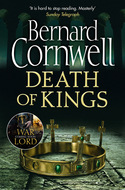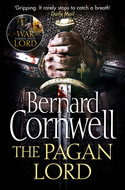Книгу нельзя скачать файлом, но можно читать в нашем приложении или онлайн на сайте.
Читать книгу: «The Pale Horseman», страница 2
I meant little to Alfred. He had a score of great lords in Wessex, while across the frontier in Mercia there were other lords and thegns who lived under Danish rule but who would fight for Wessex if Alfred gave them an opportunity. All of those great men could bring him soldiers, could rally swords and spears to the dragon banner of Wessex, while I could bring him nothing except my sword, Serpent-Breath. True, I was a lord, but I was from far off Northumbria and I led no men and so my only value to him was far in the future. I did not understand that yet. In time, as the rule of Wessex spread northwards, my value grew, but back then, in 877, when I was an angry twenty-year-old, I knew nothing except my own ambitions.
And I learned humiliation. Even today, a lifetime later, I remember the bitterness of that penitential grovel. Why did Alfred make me do it? I had won him a great victory, yet he insisted on shaming me, and for what? Because I had disturbed a church service? It was partly that, but only partly. He loved his god, loved the church and passionately believed that the survival of Wessex lay in obedience to the church and so he would protect the church as fiercely as he would fight for his country. And he loved order. There was a place for everything and I did not fit and he genuinely believed that if I could be brought to God’s heel then I would become part of his beloved order. In short he saw me as an unruly young hound that needed a good whipping before it could join the disciplined pack.
So he made me grovel.
And Æthelwold made a fool of himself.
Not at first. At first it was all solemnity. Every man in Alfred’s army was there to watch, and they made two lines in the rain. The lines stretched to the altar under the guyed sail-cloth where Alfred and his wife waited with the bishop and a gaggle of priests. ‘On your knees,’ Wulfhere said to me. ‘You have to go on your knees,’ he insisted tonelessly, ‘and crawl up to the altar. Kiss the altar cloth, then lie flat.’
‘Then what?’
‘Then God and the king forgive you,’ he said, and waited. ‘Just do it,’ he snarled.
So I did it. I went down on my knees and I shuffled through the mud, and the silent lines of men watched me, and then Æthelwold, close beside me, began to wail that he was a sinner. He threw his arms in the air, fell flat on his face, howled that he was penitent, shrieked that he was a sinner, and at first men were embarrassed and then they were amused. ‘I’ve known women!’ Æthelwold shouted at the rain, ‘and they were bad women! Forgive me!’
Alfred was furious, but he could not stop a man making a fool of himself before God. Perhaps he thought Æthelwold’s remorse was genuine? ‘I’ve lost count of the women!’ Æthelwold shouted, then beat his fists in the mud. ‘Oh God, I love tits! God, I love naked women, God, forgive me for that!’ The laughter spread, and every man must have remembered that Alfred, before piety caught him in its clammy grip, had been notorious for the women he had pursued. ‘You must help me, God!’ Æthelwold cried as we shuffled a few feet farther. ‘Send me an angel!’
‘So you can hump her?’ a voice called from the crowd and the laughter became a roar.
Ælswith was hurried away, lest she hear something unseemly. The priests whispered together, but Æthelwold’s penitence, though extravagant, seemed real enough. He was weeping. I knew he was really laughing, but he howled as though his soul was in agony. ‘No more tits, God!’ he called, ‘no more tits!’ He made a fool of himself, but, as men already thought him a fool, he did not mind. ‘Keep me from tits, God!’ he shouted, and now Alfred left, knowing that the solemnity of the day was ruined, and most of the priests left with him, so that Æthelwold and I crawled to an abandoned altar where Æthelwold turned in his mud-spattered robe and leaned against the table. ‘I hate him,’ he said softly, and I knew he referred to his uncle. ‘I hate him,’ he went on, ‘and now you owe me a favour, Uhtred.’
‘I do,’ I said.
‘I’ll think of one,’ he said.
Odda the Younger had not left with Alfred. He seemed bemused. My humiliation, which he had surely thought to enjoy, had turned into laughter and he was aware that men were watching him, judging his truthfulness, and he moved closer to a huge man who was evidently one of his bodyguards. That man was tall and very broad about the chest, but it was his face that commanded attention for it looked as though his skin had been stretched too tight across his skull, leaving his face incapable of making any expression other than one of pure hatred and wolfish hunger. Violence came off the man like the stench of a wet hound and when he looked at me it was like a beast’s soulless stare, and I instinctively understood that this was the man who would kill me if Odda found a chance to commit murder. Odda was nothing, a rich man’s spoiled son, but his money gave him the means to command men who were killers. Then Odda plucked at the tall man’s sleeve and they both turned and walked away.
Father Beocca had stayed by the altar. ‘Kiss it,’ he ordered me, ‘then lie flat.’
I stood up instead. ‘You can kiss my arse, father,’ I said. I was angry, and my anger frightened Beocca who backed away.
But I had done what the king wanted. I had been penitent.
The tall man beside Odda the Younger was named Steapa. Steapa Snotor, men called him, or Steapa the Clever. ‘It’s a joke,’ Wulfhere told me as I ripped off the penitent’s frock and pulled on my mail coat.
‘A joke?’
‘Because he’s dumb as an ox,’ Wulfhere said. ‘He’s got frog spawn instead of a brain. He’s stupid, but he’s not a stupid fighter. You didn’t see him at Cynuit?’
‘No,’ I said curtly.
‘So what’s Steapa to you?’ Wulfhere asked.
‘Nothing,’ I said. I had asked the ealdorman who Odda’s bodyguard was so that I could learn the name of the man who might try to kill me, but that possible murder was none of Wulfhere’s business.
Wulfhere hesitated, wanting to ask more, then deciding he would fetch no better answer. ‘When the Danes come,’ he said, ‘you’ll be welcome to join my men.’
Æthelwold, Alfred’s nephew, was holding my two swords and he drew Serpent-Breath from her scabbard and stared at the wispy patterns in her blade. ‘If the Danes come,’ he spoke to Wulfhere, ‘you must let me fight.’
‘You don’t know how to fight.’
‘Then you must teach me.’ He slid Serpent-Breath back into the scabbard. ‘Wessex needs a king who can fight,’ he said, ‘instead of pray.’
‘You should watch your tongue, lad,’ Wulfhere said, ‘in case it gets cut out.’ He snatched the swords from Æthelwold and gave them to me. ‘The Danes will come,’ he said, ‘so join me when they do.’
I nodded, but said nothing. When the Danes came, I thought, I planned to be with them. I had been raised by Danes after being captured at the age of ten and they could have killed me, but instead they had treated me well. I had learned their language and worshipped their gods until I no longer knew whether I was Danish or English. Had Earl Ragnar the Elder lived I would never have left them, but he had died, murdered in a night of treachery and fire, and I had fled south to Wessex. But now I would go back. Just as soon as the Danes left Exanceaster I would join Ragnar’s son, Ragnar the Younger, if he lived. Ragnar the Younger’s ship had been in the fleet which had been hammered in the great storm. Scores of ships had sunk, and the remnants of the fleet had limped to Exanceaster where the boats were now burned to ash on the riverbank beneath the town. I did not know if Ragnar lived. I hoped he lived, and I prayed he would escape Exanceaster and then I would go to him, offer him my sword, and carry that blade against Alfred of Wessex. Then, one day, I would dress Alfred in a frock and make him crawl on his knees to an altar of Thor. Then kill him.
Those were my thoughts as we rode to Oxton. That was the estate Mildrith had brought me in marriage and it was a beautiful place, but so saddled with debt that it was more of a burden than a pleasure. The farmland was on the slopes of hills facing east towards the broad sea-reach of the Uisc and above the house were thick woods of oak and ash from which flowed small clear streams that cut across the fields where rye, wheat and barley grew. The house, it was not a hall, was a smoke-filled building made from mud, dung, oak and rye-straw, and so long and low that it looked like a green, moss-covered mound from which smoke escaped through the roof’s central hole. In the attached yard were pigs, chickens and mounds of manure as big as the house. Mildrith’s father had farmed it, helped by a steward named Oswald who was a weasel, and he caused me still more trouble on that rainy Sunday as we rode back to the farm.
I was furious, resentful and vengeful. Alfred had humiliated me which made it unfortunate for Oswald that he had chosen that Sunday afternoon to drag an oak tree down from the high woods. I was brooding on the pleasures of revenge as I let my horse pick its way up the track through the trees and saw eight oxen hauling the great trunk towards the river. Three men were goading the oxen, while a fourth, Oswald, rode the trunk with a whip. He saw me and jumped off and, for a heartbeat, it looked as if he wanted to run into the trees, but then he realised he could not evade me and so he just stood and waited as I rode up to the great oak log.
‘Lord,’ Oswald greeted me. He was surprised to see me. He probably thought I had been killed with the other hostages, and that belief had made him careless.
My horse was nervous because of the stink of blood from the oxen’s flanks and he stepped backwards and forwards in small steps until I calmed him by patting his neck. Then I looked at the oak trunk that must have been forty feet long and as thick about as a man is tall. ‘A fine tree,’ I said to Oswald.
He glanced towards Mildrith who was twenty paces away. ‘Good day, lady,’ he said, clawing off the woollen hat he wore over his springy red hair.
‘A wet day, Oswald,’ she said. Her father had appointed the steward and Mildrith had an innocent faith in his reliability.
‘I said,’ I spoke loudly, ‘a fine tree. So where was it felled?’
Oswald tucked the hat into his belt. ‘On the top ridge, lord,’ he said vaguely.
‘The top ridge on my land?’
He hesitated. He was doubtless tempted to claim it came from a neighbour’s land, but that lie could easily have been exposed and so he said nothing.
‘From my land?’ I asked again.
‘Yes, lord,’ he admitted.
‘And where is it going?’
He hesitated again, but had to answer. ‘Wigulf’s mill.’
‘Wigulf buys it?’
‘He’ll split it, lord.’
‘I didn’t ask what he will do with it,’ I said, ‘but whether he will buy it.’
Mildrith, hearing the harshness in my voice, intervened to say that her father had sometimes sent timber to Wigulf’s mill, but I waved her to silence. ‘Will he buy it?’ I asked Oswald.
‘We need the timber, lord, to make repairs,’ the steward said, ‘and Wigulf takes his fee in split wood.’
‘And you drag the tree on a Sunday?’ He had nothing to say to that. ‘Tell me,’ I went on, ‘if we need planks for repairs, then why don’t we split the trunk ourselves? Do we lack men? Or wedges? Or mauls?’
‘Wigulf has always done it,’ Oswald said in a surly tone.
‘Always?’ I repeated and Oswald said nothing. ‘Wigulf lives in Exanmynster?’ I guessed. Exanmynster lay a mile or so northwards and was the nearest settlement to Oxton.
‘Yes, lord,’ Oswald said.
‘So if I ride to Exanmynster now,’ I said, ‘Wigulf will tell me how many similar trees you’ve delivered to him in the last year?’
There was silence, except for the rain dripping from leaves and the intermittent burst of birdsong. I edged my horse a few steps closer to Oswald, who gripped his whip’s handle as if readying it to lash out at me. ‘How many?’ I asked.
Oswald said nothing.
‘How many?’ I demanded, louder.
‘Husband,’ Mildrith called.
‘Quiet!’ I shouted at her and Oswald looked from me to her and back to me. ‘And how much has Wigulf paid you?’ I asked. ‘What does a tree like this fetch? Eight shillings? Nine?’
The anger that had made me act so impetuously at the king’s church service rose again. It was plain that Oswald was stealing the timber and being paid for it, and what I should have done was charge him with theft and have him arraigned before a court where a jury of men would decide his guilt or innocence, but I was in no mood for such a process. I just drew Serpent-Breath and kicked my horse forward. Mildrith screamed a protest, but I ignored her. Oswald ran, and that was a mistake, because I caught him easily, and Serpent-Breath swung once and opened up the back of his skull so I could see brains and blood as he fell. He twisted in the leaf mould and I wheeled the horse back and stabbed down into his throat.
‘That was murder!’ Mildrith shouted at me.
‘That was justice,’ I snarled at her, ‘something lacking in Wessex.’ I spat on Oswald’s body, which was still twitching. ‘The bastard’s been stealing from us.’
Mildrith kicked her horse, leading the nurse who carried our child uphill. I let her go. ‘Take the trunk up to the house,’ I ordered the slaves who had been goading the oxen. ‘If it’s too big to drag uphill then split it here and take the planks to the house.’
I searched Oswald’s house that evening and discovered fifty-three shillings buried in the floor. I took the silver, confiscated his cooking pots, spit, knives, buckles and a deerskin cloak, then drove his wife and three children off my land. I had come home.
Two
My anger was not slaked by Oswald’s killing. The death of a dishonest steward was no consolation for what I perceived as a monstrous injustice. For the moment Wessex was safe from the Danes, but it was only safe because I had killed Ubba Lothbrokson and my reward had been humiliation.
Poor Mildrith. She was a peaceable woman who thought well of everyone she met, and now she found herself married to a resentful, angry warrior. She was frightened of Alfred’s wrath, terrified that the church would punish me for disturbing its peace, and worried that Oswald’s relatives would demand a wergild from me. And so they would. A wergild was the blood price that every man, woman and child possessed. Kill a man and you must pay his price or else die yourself, and I had no doubt that Oswald’s family would go to Odda the Younger, who had been named the Ealdorman of Defnascir because his father was too badly wounded to continue as ealdorman, and Odda would instruct the shire reeve to pursue me and place me on trial, but I did not care. I hunted boar and deer, I brooded and waited for news of the negotiations at Exanceaster. I was expecting Alfred to do what he always did which was to make peace with the Danes and so release them, and when he did I would go to Ragnar.
And as I waited I found my first retainer. He was a slave and I discovered him in Exanmynster on a fine spring day. There was a hiring-fair where men looked for employment through the busy days of hay-making and harvest, and like all fairs there were jugglers, storytellers, stiltwalkers, musicians and acrobats. There was also a tall, white-haired man with a lined, serious face, who was selling enchanted leather bags that turned iron into silver. He showed us how it was done, and I saw him place two common nails into the bag and a moment later they were pure silver. He said we had to place a silver crucifix in the bag and then sleep one night with it tied around our necks before the magic worked and I paid him three silver shillings for one bag, and it never worked. I spent months searching for the man, but never found him. Even these days I come across such men and women, selling sorcerous pouches or boxes, and now I have them whipped and run off my land, but I was only twenty then and I believed my own eyes. That man had attracted a large crowd, but there were even more people gathered by the church gate where shouts erupted every few minutes. I pushed my horse into their rear ranks, getting dirty looks from folk who knew I had killed Oswald, but none dared accuse me of the murder for I carried both Serpent-Breath and Wasp-Sting.
A young man was by the church gate. He was stripped to the waist, barefooted and had a rope around his neck, and the rope was tied to the gatepost. In his hand was a short, stout stave. He had long unbound fair hair, blue eyes, a stubborn face and blood all over his chest, belly and arms. Three men guarded him. They too were fair-haired and blue-eyed, and they shouted in a strange accent. ‘Come and fight the heathen! Three pennies to make the bastard bleed! Come and fight!’
‘Who is he?’ I asked.
‘A Dane, lord, a pagan Dane.’ The man tugged off his hat when he spoke to me, then turned back to the crowd. ‘Come and fight him! Get your revenge! Make a Dane bleed! Be a good Christian! Hurt a pagan!’
The three men were Frisians. I suspected they had been in Alfred’s army and, now that he was talking to the Danes rather than fighting them, the three had deserted. Frisians come from across the sea and they come for one reason only, money, and this trio had somehow captured the young Dane and were profiting from him so long as he lasted. And that could have been some time, for he was good. A strong young Saxon paid his three pence and was given a sword with which he hacked wildly at the prisoner, but the Dane parried every blow, wood chips flying from his stave, and when he saw an opening he cracked his opponent around the head hard enough to draw blood from his ear. The Saxon staggered away, half stunned, and the Dane rammed the stave into his belly and, as the Saxon bent to gasp for breath, the stave whistled around in a blow that would have cracked his skull open like an egg, but the Frisians dragged on the rope so that the Dane fell backwards. ‘Do we have another hero?’ a Frisian shouted as the young Saxon was helped away. ‘Come on, lads! Show your strength! Beat a Dane bloody!’
‘I’ll beat him,’ I said. I dismounted and pushed through the crowd. I gave my horse’s reins to a boy, then drew Serpent-Breath. ‘Three pence?’ I asked the Frisians.
‘No, lord,’ one of them said.
‘Why not?’
‘We don’t want a dead Dane, do we?’ the man answered.
‘We do!’ someone shouted from the crowd. The folk in the Uisc valley did not like me, but they liked the Danes even less and they relished the prospect of watching a prisoner being slaughtered.
‘You can only wound him, lord,’ the Frisian said. ‘And you must use our sword.’ He held out the weapon. I glanced at it, saw its blunt edge, and spat.
‘Must?’ I asked.
The Frisian did not want to argue. ‘You can only draw blood, lord,’ he said.
The Dane flicked hair from his eyes and watched me. He held the stave low. I could see he was nervous, but there was no fear in his eyes. He had probably fought a hundred battles since the Frisians captured him, but those fights had been against men who were not soldiers, and he must have known, from my two swords, that I was a warrior. His skin was blotched with bruises and laced by blood and scars, and he surely expected another wound from Serpent-Breath, but he was determined to give me a fight.
‘What’s your name?’ I asked in Danish.
He blinked at me, surprised.
‘Your name, boy,’ I said. I called him ‘boy’, though he was not much younger than me.
‘Haesten,’ he said.
‘Haesten who?’
‘Haesten Storrison,’ he said, giving me his father’s name.
‘Fight him! Don’t talk to him!’ a voice shouted from the crowd.
I turned to stare at the man who had shouted and he could not meet my gaze, then I turned fast, very fast, and whipped Serpent-Breath in a quick sweep that Haesten instinctively parried so that Serpent-Breath cut through the stave as if it was rotten. Haesten was left with a stub of wood, while the rest of his weapon, a yard of thick ash, lay on the ground.
‘Kill him!’ someone shouted.
‘Just draw blood, lord,’ a Frisian said, ‘please, lord. He’s not a bad lad, for a Dane. Just make him bleed and we’ll pay you.’
I kicked the ash stave away from Haesten. ‘Pick it up,’ I said.
He looked at me nervously. To pick it up he would have to go to the end of his tether, then stoop, and at that moment he would expose his back to Serpent-Breath. He watched me, his eyes bitter beneath the fringe of dirty hair, then decided I would not attack him as he bent over. He went to the stave and, as he leaned down, I kicked it a few inches further away. ‘Pick it up,’ I ordered him again.
He still held the stub of ash and, as he took a further step, straining against the rope, he suddenly whipped around and tried to ram the broken end into my belly. He was fast, but I had half expected the move and caught his wrist in my left hand. I squeezed hard, hurting him. ‘Pick it up,’ I said a third time.
This time he obeyed, stooping to the stave, and to reach it he stretched his tether tight and I slashed Serpent-Breath onto the taut rope, severing it. Haesten, who had been straining forward, fell onto his face as the hide rope was cut. I put my left foot onto his back and let the tip of Serpent-Breath rest on his spine. ‘Alfred,’ I said to the Frisians, ‘has ordered that all Danish prisoners are to be taken to him.’
The three looked at me, said nothing.
‘So why have you not taken this man to the king?’ I demanded.
‘We didn’t know, lord,’ one of them said, ‘no one told us,’ which was not surprising because Alfred had given no such order.
‘We’ll take him to the king now, lord,’ another reassured me.
‘I’ll save you the trouble,’ I said. I took my foot off Haesten. ‘Get up,’ I told him in Danish. I threw a coin to the boy holding my horse and hauled myself into the saddle where I offered Haesten a hand. ‘Get up behind me,’ I ordered him.
The Frisians protested, coming at me with their swords drawn, so I pulled Wasp-Sting from her scabbard and gave it to Haesten who had still not mounted. Then I turned the horse towards the Frisians and smiled at them. ‘These people,’ I waved Serpent-Breath at the crowd, ‘already think I am a murderer. I’m also the man who met Ubba Lothbrokson beside the sea and killed him there. I tell you this so you may boast that you killed Uhtred of Bebbanburg.’
I lowered the sword so it pointed at the nearest man and he backed away. The others, no more eager to fight than the first, went with him. Haesten then pulled himself up behind me and I spurred the horse into the crowd, which parted reluctantly.
Once free of them I made Haesten dismount and give me back Wasp-Sting. ‘How did you get captured?’ I asked him.
He told me he had been on one of Guthrum’s ships caught in the storm, and his ship had sunk, but he had clung to some wreckage and been washed ashore where the Frisians had found him. ‘There were two of us, lord,’ he said, ‘but the other died.’
‘You’re a free man now,’ I told him.
‘Free?’
‘You’re my man,’ I said, ‘and you’ll give me an oath, and I’ll give you a sword.’
‘Why?’ he wanted to know.
‘Because a Dane saved me once,’ I said, ‘and I like the Danes.’
I also wanted Haesten because I needed men. I did not trust Odda the Younger, and I feared Steapa Snotor, Odda’s warrior, and so I would have swords at Oxton. Mildrith, of course, did not want sword-Danes at her house. She wanted ploughmen and peasants, milkmaids and servants, but I told her I was a lord, and a lord has swords.
I am indeed a lord, a lord of Northumbria. I am Uhtred of Bebbanburg. My ancestors, who can trace their lineage back to the god Woden, the Danish Odin, were once kings in northern England, and if my uncle had not stolen Bebbanburg from me when I was just ten years old I would have lived there still as a Northumbrian lord safe in his sea-washed fastness. The Danes had captured Northumbria, and their puppet king, Ricsig, ruled in Eoferwic, but Bebbanburg was too strong for any Dane and my uncle Ælfric ruled there, calling himself Ealdorman Ælfric, and the Danes left him in peace so long as he did not trouble them, and I often dreamed of going back to Northumbria to claim my birthright. But how? To capture Bebbanburg I would need an army, and all I had was one young Dane, Haesten.
And I had other enemies in Northumbria. There was Earl Kjartan and his son Sven, who had lost an eye because of me, and they would kill me gladly, and my uncle would pay them to do it, and so I had no future in Northumbria, not then. But I would go back. That was my soul’s wish, and I would go back with Ragnar the Younger, my friend, who still lived because his ship had weathered the storm. I heard that from a priest who had listened to the negotiations outside Exanceaster and he was certain that Earl Ragnar had been one of the Danish lords in Guthrum’s delegation. ‘A big man,’ the priest told me, ‘and very loud.’ That description convinced me that Ragnar lived and my heart was glad for it, for I knew that my future lay with him, not with Alfred. When the negotiations were finished and a truce made, the Danes would doubtless leave Exanceaster and I would give my sword to Ragnar and carry it against Alfred, who hated me. And I hated him.
I told Mildrith that we would leave Defnascir and go to Ragnar, that I would be his man and that I would pursue my bloodfeud against Kjartan and against my uncle under Ragnar’s eagle banner, and Mildrith responded with tears and more tears.
I cannot bear a woman’s crying. Mildrith was hurt and she was confused and I was angry and we snarled at each other like wildcats and the rain kept falling and I raged like a beast in a cage and wished Alfred and Guthrum would finish their talking because everyone knew that Alfred would let Guthrum go, and once Guthrum left Exanceaster then I could join the Danes and I did not care whether Mildrith came or not, so long as my son, who bore my name, went with me. So by day I hunted, at night I drank and dreamed of revenge and then one evening I came home to find Father Willibald waiting in the house.
Willibald was a good man. He had been chaplain to Alfred’s fleet when I commanded those twelve ships, and he told me he was on his way back to Hamtun, but he thought I would like to know what had unfolded in the long talks between Alfred and Guthrum. ‘There is peace, lord,’ he told me, ‘thanks be to God, there is peace.’
‘Thanks be to God,’ Mildrith echoed.
I was cleaning the blood from the blade of a boar spear and said nothing. I was thinking that Ragnar was released from the siege now and I could join him.
‘The treaty was sealed with solemn oaths yesterday,’ Willibald said, ‘and so we have peace.’
‘They gave each other solemn oaths last year,’ I said sourly. Alfred and Guthrum had made peace at Werham, but Guthrum had broken the truce and murdered the hostages he had been holding. Eleven of the twelve had died, and only I had lived because Ragnar was there to protect me. ‘So what have they agreed?’ I asked.
‘The Danes are to give up all their horses,’ Willibald said, ‘and march back into Mercia.’
Good, I thought, because that was where I would go. I did not say that to Willibald, but instead sneered that Alfred was just letting them march away. ‘Why doesn’t he fight them?’ I asked.
‘Because there are too many, lord. Because too many men would die on both sides.’
‘He should kill them all.’
‘Peace is better than war,’ Willibald said.
‘Amen,’ Mildrith said.
I began sharpening the spear, stroking the whetstone down the long blade. It seemed to me that Alfred had been absurdly generous. Guthrum, after all, was the one remaining leader of any stature on the Danish side, and he had been trapped, and if I had been Alfred there would have been no terms, only a siege, and at its end the Danish power in southern England would have been broken. Instead Guthrum was to be allowed to leave Exanceaster. ‘It is the hand of God,’ Willibald said.
I looked at him. He was a few years older than I was, but always seemed younger. He was earnest, enthusiastic and kind. He had been a good chaplain to the twelve ships, though the poor man was ever seasick and blanched at the sight of blood. ‘God made the peace?’ I asked sceptically.
‘Who sent the storm that sank Guthrum’s ships?’ Willibald retorted fervently, ‘who delivered Ubba into our hands?’
‘I did,’ I said.
He ignored that. ‘We have a godly king, lord,’ he said, ‘and God rewards those that serve him faithfully. Alfred has defeated the Danes! And they see it! Guthrum can recognise divine intervention! He has been making enquiries about Christ.’
I said nothing.
‘Our king believes,’ the priest went on, ‘that Guthrum is not far from seeing the true light of Christ.’ He leaned forward and touched my knee. ‘We have fasted, lord,’ he said, ‘we have prayed, and the king believes that the Danes will be brought to Christ and when that happens there will be a permanent peace.’
He meant every word of that nonsense and, of course, it was sweet music to Mildrith’s ears. She was a good Christian and had great faith in Alfred, and if the king believed that his god would bring victory then she would believe it too. It seemed madness to me, but I said nothing as a servant brought us barley ale, bread, smoked mackerel and cheese. ‘We shall have a Christian peace,’ Willibald said, making the sign of the cross above the bread before he ate, ‘sealed by hostages.’
‘We’ve given Guthrum hostages again?’ I asked, astonished.
‘No,’ Willibald said. ‘But he has agreed to give us hostages. Including six earls!’
I stopped sharpening the spear and looked at Willibald. ‘Six earls?’
Бесплатный фрагмент закончился.
Начислим
+17
Покупайте книги и получайте бонусы в Литрес, Читай-городе и Буквоеде.
Участвовать в бонусной программе
